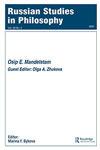Lev Vygotsky’s Psychology of Freedom
IF 0.1
4区 哲学
Q4 Arts and Humanities
引用次数: 1
Abstract
ABSTRACT The author argues that the idea of freedom guided Vygotsky’s research from his very first steps in psychology, when he was deliberating on the “overman” and on “mastering one’s own behavior” by means of signs. The freedom of actions and intentions, not intellectual superiority, is the most essential distinction of “cultured man” from his kin in the animal kingdom. Man is free as long as he acts as a human—in accordance with culture rather than situationally, under the pressure of external natural forces. In the “height,” or “acmeist,” psychology of his later years, Vygotsky defines freedom as “the affect in the concept,” in the spirit of Spinoza’s Ethics. It is from this angle that the article studies the genesis of “psychological systems”—the age-specific changes and social varieties of affect–concept relationship, as well as the disruption of this relationship typical of schizophrenia.列夫·维果茨基的自由心理学
摘要作者认为,自由思想从维果茨基进入心理学的最初阶段就指导了他的研究,当时他正在思考“过度人”和通过符号“掌握自己的行为”。行动和意图的自由,而不是智力上的优越,是“有教养的人”与动物王国中的亲属最本质的区别。人是自由的,只要他作为一个人——根据文化而不是在外部自然力的压力下。在他晚年的“高度”或“极致主义”心理学中,维果茨基根据斯宾诺莎的《伦理学》精神,将自由定义为“概念中的影响”。正是从这个角度,本文研究了“心理系统”的起源——情感-概念关系的年龄特异性变化和社会多样性,以及精神分裂症典型的这种关系的破坏。
本文章由计算机程序翻译,如有差异,请以英文原文为准。
求助全文
约1分钟内获得全文
求助全文
来源期刊

RUSSIAN STUDIES IN PHILOSOPHY
PHILOSOPHY-
CiteScore
0.10
自引率
0.00%
发文量
14
期刊介绍:
Russian Studies in Philosophy publishes thematic issues featuring selected scholarly papers from conferences and joint research projects as well as from the leading Russian-language journals in philosophy. Thematic coverage ranges over significant theoretical topics as well as topics in the history of philosophy, both European and Russian, including issues focused on institutions, schools, and figures such as Bakhtin, Fedorov, Leontev, Losev, Rozanov, Solovev, and Zinovev.
 求助内容:
求助内容: 应助结果提醒方式:
应助结果提醒方式:


